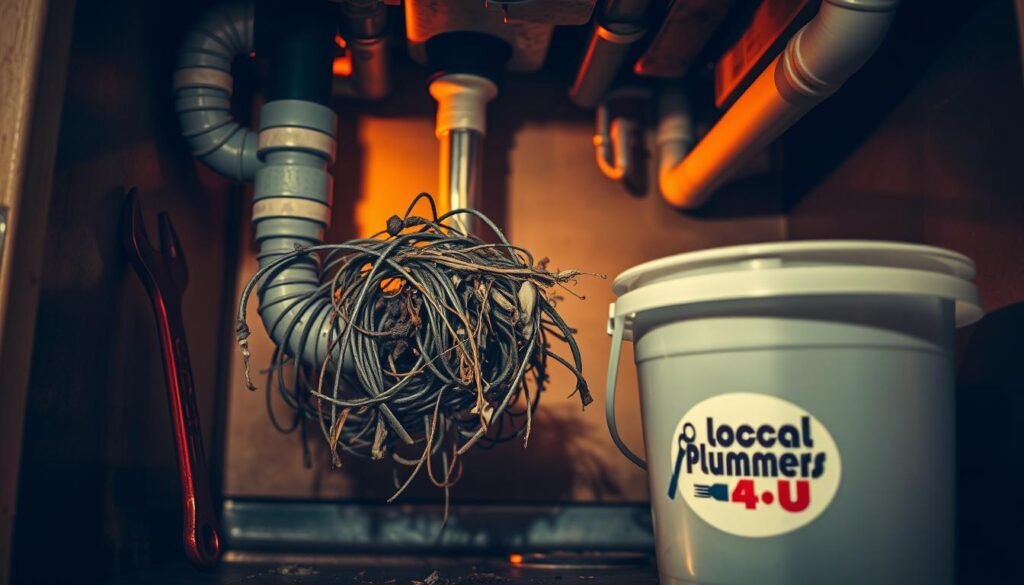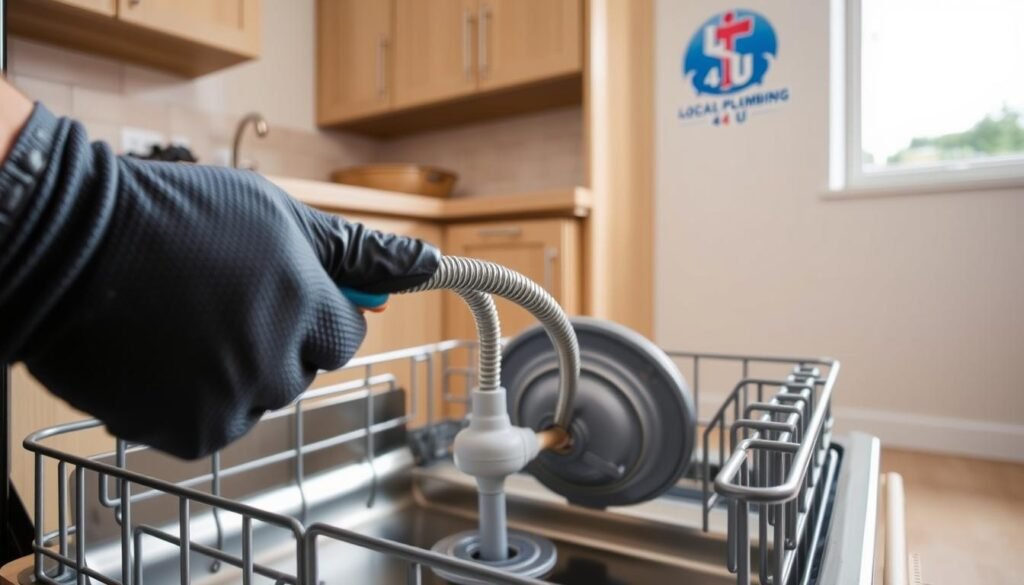Did you know 80 million American households use dishwashers every day? That’s about 65% of homes. When your dishwasher breaks down, it can quickly become a big problem and expensive to fix.
At Local Plumbers 4 U, we know how small issues can mess up your day. We’ve seen everything from mysterious puddles to dishwashers that don’t clean properly. These problems happen to both homeowners and business owners in the Inland Empire.
Many dishwasher problems can be fixed by yourself if you know what’s causing them. For example, clogged drain hoses can cause water backup. But, some issues need a professional, like problems with water supply or electrical parts.
Our team at Local Plumbers 4 U is ready to help in Riverside County, San Bernardino, Corona, and the Inland Empire. Call us at 909-378-9322 when you can’t fix it yourself. We’re experts in fixing tough kitchen plumbing problems fast and well.
Key Takeaways
- Nearly 65% of American homes use dishwashers daily, making proper maintenance essential
- Common issues include drainage problems, filling failures, and door leaks
- Many dishwasher problems stem from simple clogs or loose connections you can fix yourself
- Professional help is recommended for water supply or electrical component issues
- Regular maintenance extends appliance lifespan and prevents costly emergency repairs
- Local Plumbers 4 U serves the entire Inland Empire region with specialized appliance repair services
Understanding Common Dishwasher Plumbing Issues
Knowing the common dishwasher plumbing problems is key to fixing them. If your dishwasher isn’t working right, it can mess up your day and even cause water damage. By knowing the usual plumbing issues, you can figure out if you can fix it yourself or if you need a pro.
Most dishwasher plumbing problems fall into a few main categories. These include issues with water flow, drainage, connections, and mechanical parts. Let’s look at the most common plumbing problems you might face with your dishwasher.
Clogged Drain Lines
Drain clogs are a big problem for many dishwasher owners. When your dishwasher’s drain line gets clogged, water can’t get out. This leaves standing water in the tub after a cycle.
These clogs happen when food, grease, and detergent residue build up. Even though dishwashers have filters, small debris can get into the drain hose or pump. This creates blockages that stop water from flowing.
Signs of a clogged drain line include:
- Standing water in the bottom of the dishwasher
- Slow draining during or after cycles
- Gurgling sounds coming from the drain or sink
- Water backing up into the sink when the dishwasher runs

Leaky Hoses
Leaks are another common problem that can cause big issues if not fixed fast. Your dishwasher connects to your plumbing system through several hoses. These include supply lines for fresh water and drain hoses for dirty water.
Over time, these hoses can wear out, crack, or come loose. When this happens, water can leak out during use. This can damage your floors, cabinets, and the area under your dishwasher.
Common causes of leaky hoses include:
- Natural wear and tear on rubber hoses
- Loose clamps at connection points
- Improper installation of hose connections
- Physical damage to hoses from nearby objects
Unresponsive Dishwasher
If your dishwasher won’t start or respond, it might be a plumbing issue, not an electrical one. Dishwashers have safety features that stop them from working if there’s no water flow.
An unresponsive dishwasher could mean problems with water pressure, supply line blockages, or issues with the water inlet. Before thinking it’s an electrical problem, check the plumbing first.
Potential plumbing-related causes of an unresponsive dishwasher include:
- Closed water supply valve under the sink
- Kinked or blocked water supply line
- Low household water pressure
- Faulty float switch (which detects water levels)
Faulty Water Inlet Valve
The water inlet valve controls how much water goes into your dishwasher. If it malfunctions, your dishwasher might not fill up right, fill too slow, or not at all. This valve connects to your home’s water supply and controls water flow during different cycles.
Over time, mineral deposits from hard water can build up in the valve, or its parts can wear out. When looking at common dishwasher plumbing problems, a faulty inlet valve is often the cause of water supply issues.
Signs of a problematic water inlet valve include:
- Dishwasher not filling with water
- Unusually long filling times
- Dishes not getting clean due to insufficient water
- Continuous filling that doesn’t stop
| Issue | Primary Symptoms | Common Causes | Potential Damage |
|---|---|---|---|
| Clogged Drain Lines | Standing water, slow draining | Food debris, grease buildup | Water damage, mold growth |
| Leaky Hoses | Water under dishwasher, damp cabinets | Worn gaskets, loose connections | Floor damage, cabinet rot |
| Unresponsive Dishwasher | Won’t start, no water filling | Closed valves, blocked lines | Inconvenience, possible motor damage |
| Faulty Water Inlet Valve | Improper filling, poor cleaning | Mineral deposits, valve wear | Inefficient cleaning, water waste |
Knowing these common dishwasher plumbing issues helps you spot problems early. Fixing them quickly can prevent bigger, more expensive repairs later. Next, we’ll look at DIY solutions for these problems so you can try to fix them yourself before calling a pro.
DIY Solutions for Dishwasher Plumbing Problems
You can fix many dishwasher plumbing issues yourself with basic tools and some guidance. Most problems are due to clogs, worn-out parts, or small mistakes during installation. With tools like a screwdriver, pliers, and towels, you can solve these problems and make your dishwasher work better.
Regular upkeep can stop many problems before they start. Knowing how your dishwasher’s plumbing works helps you find and fix issues. Here are some DIY fixes for common dishwasher plumbing troubles.
Clearing Clogs in Drain Lines
Clogged drain lines are a common problem. Food, grease, and soap scum can block water flow, making your dishwasher drain slowly or not at all.
Start by checking the dishwasher’s filter basket at the bottom. Remove any debris and rinse it well. This often fixes minor issues.

If the problem doesn’t go away, you need to check the drain hose. Here’s how:
- Turn off the dishwasher’s power for safety
- Pull the dishwasher out to access the drain hose at the back
- Place towels under the connection points to catch water
- Disconnect the drain hose from both the dishwasher and the sink drain or garbage disposal
- Check for blockages by running water through the hose or using a straightened wire hanger to gently dislodge clogs
For tough clogs, mix equal parts baking soda and vinegar. Pour it into the drain basket and let it sit for 15-20 minutes before running hot water. This natural solution can clear clogs without harsh chemicals.
Replacing Leaky Hoses
Leaky hoses waste water and can damage your kitchen. Most dishwashers have two hoses: the water supply hose and the drain hose. These can crack or loosen over time.
To replace a leaky supply hose:
- Turn off the water supply valve under the sink
- Disconnect the old hose from both the dishwasher and water supply valve
- Take the old hose to your hardware store to ensure you get the correct replacement
- Install the new hose, making sure connections are tight but not over-tightened
- Turn the water back on and check for leaks
For drain hose replacement, follow similar steps. Make sure the new hose is correctly routed. The drain hose should loop up to the countertop level before connecting to the drain to prevent backflow.
When choosing replacement hoses, consider stainless steel braided supply lines. They are more durable than rubber hoses and protect against leaks and bursts.
Troubleshooting Unresponsive Dishwashers
When your dishwasher won’t start or stops mid-cycle, it might be an electrical or water pressure problem. Before calling a professional, try these steps:
First, check the basics. Make sure the dishwasher is plugged in and the circuit breaker hasn’t tripped. Sometimes, just resetting the power can solve the problem.
Next, look at the door latch. Dishwashers won’t run if the door isn’t closed properly. Clean the latch area and check for alignment. A misaligned door can stop the dishwasher from running.
| Problem | Possible Cause | DIY Solution |
|---|---|---|
| No power | Tripped breaker or blown fuse | Reset breaker or replace fuse |
| Won’t fill with water | Closed water supply valve | Open valve fully |
| Stops mid-cycle | Faulty door switch | Clean or replace door switch |
| Control panel unresponsive | Control board issue | Reset by disconnecting power for 5 minutes |
Water pressure problems can also cause issues. Check that the water supply valve under the sink is fully open. Low water pressure might prevent the dishwasher from filling properly, triggering an automatic shutdown.
If your dishwasher fills but doesn’t wash well, the spray arms might be clogged. Remove them and clear debris from the spray holes. Use a toothpick or small wire to remove stubborn particles.
For electronic control issues, try a hard reset by unplugging the dishwasher for about 5 minutes. This can fix minor glitches in the control panel. After reconnecting power, run a test cycle to see if the problem is solved.
Regular maintenance and quick fixes for minor issues can prevent many dishwasher problems. By addressing these issues early, you can avoid costly repairs and extend your appliance’s life.
When to Call an Expert from Local Plumbers 4 U
While you can fix many dishwasher problems yourself, some need a pro. Knowing when to call a plumber can save you time and money. It also prevents damage to your home.
Signs You Need Professional Help
Contact a professional plumber if you notice these warning signs:
• Persistent leaks that continue after basic repairs
• Electrical issues with your dishwasher
• Major clogs that resist DIY clearing methods
• Water supply issues affecting multiple appliances
• Installation errors with new dishwashers
• Strange noises coming from supply lines
How to Contact Local Plumbers 4 U
When dishwasher problems are too much for you, Local Plumbers 4 U is here. Their team has the skills and tools to fix complex plumbing issues safely and well.
Call 909-378-9322 for help right away or visit localplumbersincorona.com to book a service online.
FAQ About Dishwasher Plumbing Issues
How often should I clean my dishwasher drain?
Clean your dishwasher drain monthly to prevent clogs and keep it running well.
Can hard water damage my dishwasher?
Yes, hard water can clog spray arms and affect water flow. Use water softeners or dishwasher cleaners regularly.
Is it normal for my dishwasher to make gurgling sounds?
Occasional gurgling is normal during drainage. But, if it keeps happening, it might mean there’s a clog.
How long should a dishwasher last before replacement?
Most dishwashers last 7-10 years with good care. If yours needs frequent repairs, it’s time for a new one.
